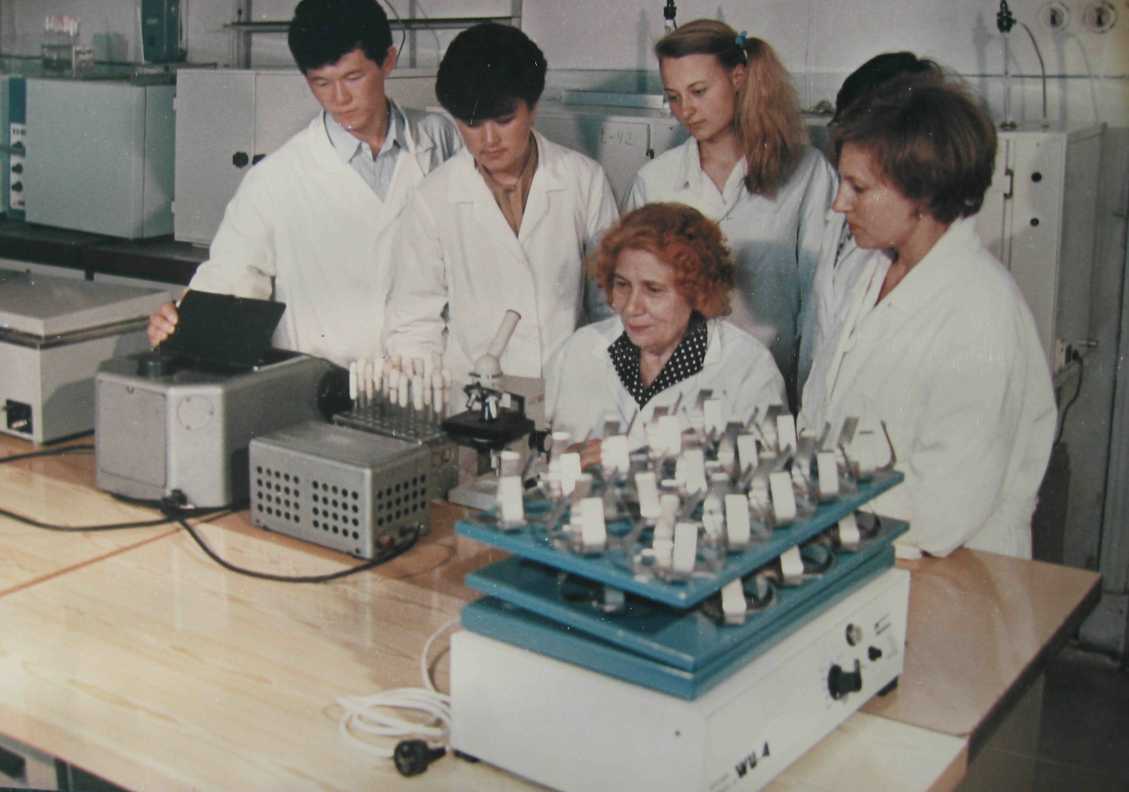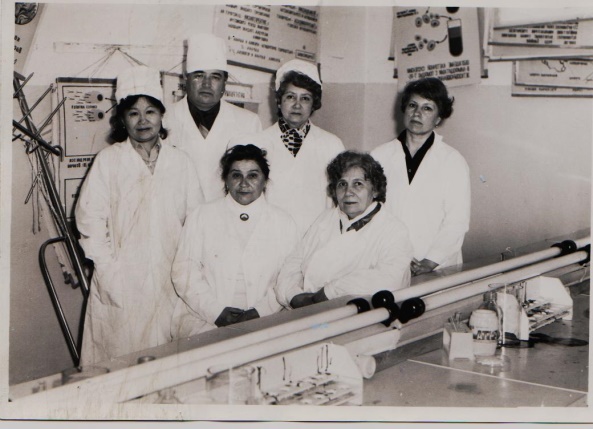Microbiology, Virology and Immunology
The Department of Microbiology, Virology and Immunology was formed one of the first as part of the Alma-Ata Zooveterinary Institute, in 1929.
As the department of basic disciplines, the department of “Microbiology, Virology and Immunology” makes a huge contribution to the training of agricultural personnel in educational programs 6B09101 - Veterinary Medicine, 6B09102 - Veterinary Sanitation, 6B09103 – Veterinary food safety and technology, 6B09104 – Veterinary, 6B08102 - Soil Science and Agrochemistry, 6B08104 - Plant Protection and Quarantine, 6B08101 - Agronomy , 6B05102 - Biotechnology, 6B08201 - Technology of production of livestock products, 6B07207 - Technology of food products.
Currently, the department has 13 employees, including 3 doctors of science, 5 candidates of science, 2 PhD, 3 assistants. The support staff is represented by 1 senior laboratory assistant and 4 laboratory assistants.
Specialists are also trained at the master's level (7M09101 - Veterinary Medicine, 7M09102 - Veterinary Sanitation) and doctoral level (8D09101 - Veterinary Medicine). Currently, 8 master's students and 9 PhD doctoral students are studying.
The degree of education of the department is 71,4%, the average age of the teaching staff is 46,4 years. The department includes 2 holders of the state grant of the Ministry of Education and Science of the Republic of Kazakhstan “Best University Teacher”.
The qualifications of employees and language competencies allow training in Kazakh, Russian and English.
The Department of Microbiology, Virology and Immunology was founded in 1929.
The first head was Professor Ieronim Vasilyev Saykovich, a famous microbiologist and first rector of the Alma-Ata Zooveterinary Institute.
He has published more than 130 scientific papers. The main directions of his scientific research were related to the diagnosis of anthrax using the Ascoli method, the disinfection of hides against anthrax and infectious abortion of horses.
From 1934 to 1961, the department was headed by corresponding member of the Academy of Sciences of the Kazakh SSR, Professor P.A. Bulanov.
He studied the physiological properties of snake venom and, on this basis, developed methods for producing antivenom serums and vaccines. The method for obtaining serums against snake venom was approved by the State Control Institute of Veterinary Preparations (Moscow).
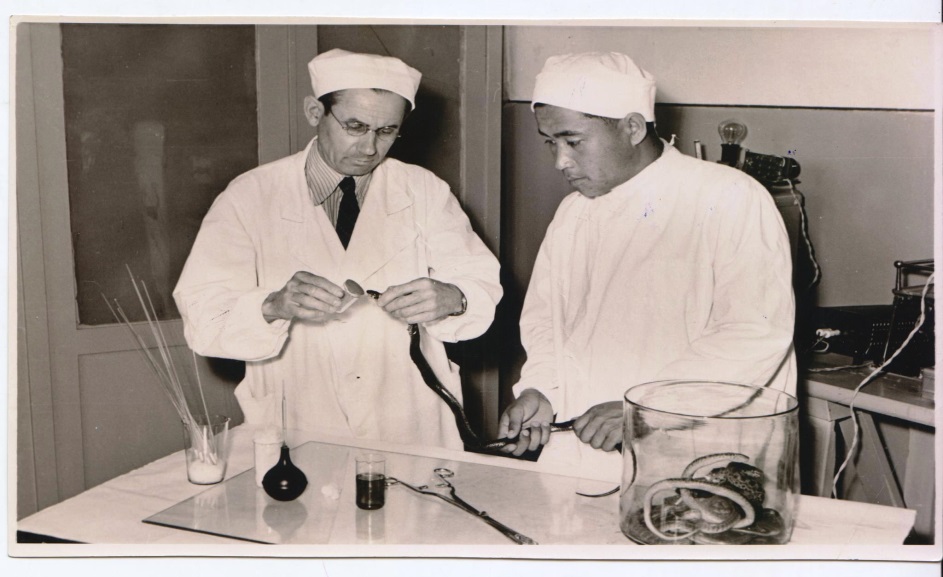
Professor Bulanov P.A. assistant Nauryzbaev E.N. in the process of receiving snake venom
Subsequently, this work was continued, and the preparations were improved by his graduate student E.N. Nauryzbaev , who then became an associate professor of the department. Professor P.A. Bulanov also developed a vaccine against brucellosis in cattle. The resulting attenuated strain (A6-1) for the prevention of brucellosis was tested under experimental conditions with positive results (P.A. Bulanov, B.A. Matvienko, E.N. Nauryzbaev and A.A. Myakushena ).
From 1961 to 1988, the department was headed by Doctor of Biological Sciences. , Professor B.A. Matvienko. He became a pioneer in the use of live vaccines against salmonellosis in animals. For many years, vaccines have been tested on farms in Kazakhstan on large numbers of animals. A live vaccine against salmonellosis in pigs has been introduced into practice.
In 1972, for the development of means for the specific prevention of salmonellosis in pigs and sheep, Professor B.A. Matvienko and associate professor O.Sh. Baiturina was awarded the State Prize of the Kazakh SSR.
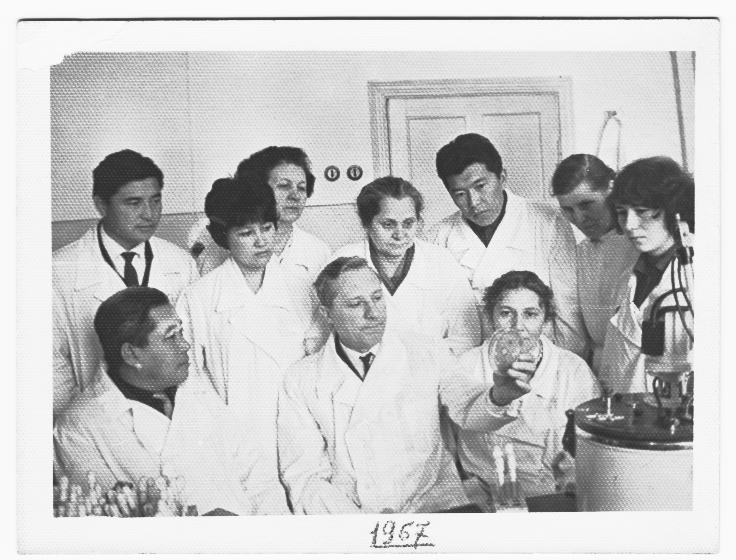
From left to right: standing - Tolysbaev B.T., Bokenbaeva K.T., Galenkovskaya E.F., Myakushina N.A., Kenzhebaev M.Sh., Petrova A.M., Ibraimova. Sitting - Nauryzbaev E.N., Matvienko B.A., Ivanova G.M.
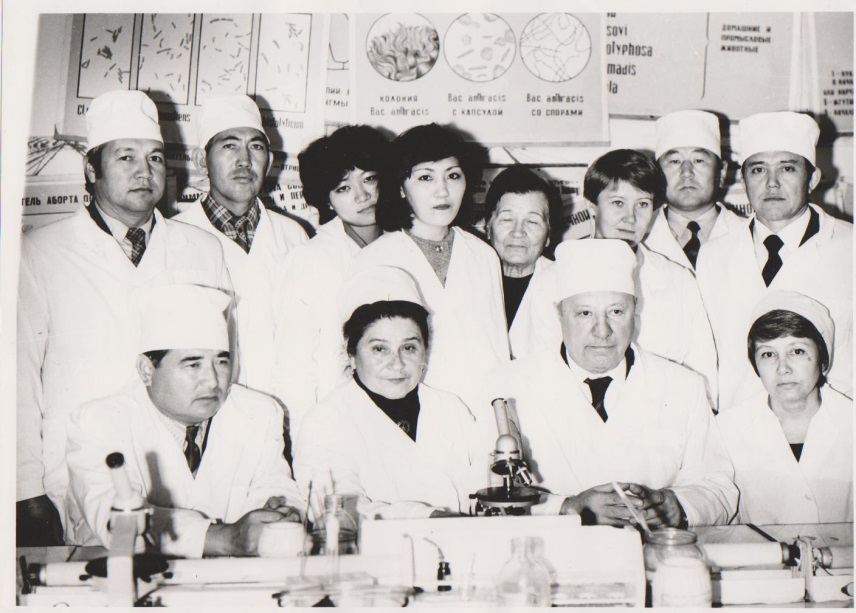
From left to right: standing Tulkibaev K.A., Beisembaev O.B., students, Ereshenko N.V., Egorova N., Arzymbetov D.E., Biyashev K.B. Sitting : Tolysbaev B.T., Bayturina O.Sh., Matvienko B.A., Bokenbaeva K.T.
From 1989 to 1996, the department was headed by Doctor of Biological Sciences, Professor B.T. Tolysbaev . Under his leadership, valuable production strains of urobacteria were obtained, which were deposited in the All-Russian Research Institute of Genetics and Selection of Industrial Microorganisms.
Scientific activity: author of more than 240 scientific papers, incl . monographs - “Urobacteria and prospects for their use in practice” (1993), “Urobacterium preparations in poultry farming” (1994), textbook “Veterinary Microbiology” (in Kazakh, 1999), “Workshop on microbiology and veterinary sanitation” (1996), NTD and USSR copyright certificates for 5 drugs. Awarded with badges - “For excellent success in work” (VO USSR, 1969), “Inventor of the USSR” (1986), medals - “For the development of virgin lands” (1966) and “For labor valor” (1986). Prepared 1 doctor and 6 candidates of science ( Bisenbaev O., Myktybaeva R.Zh., etc.).
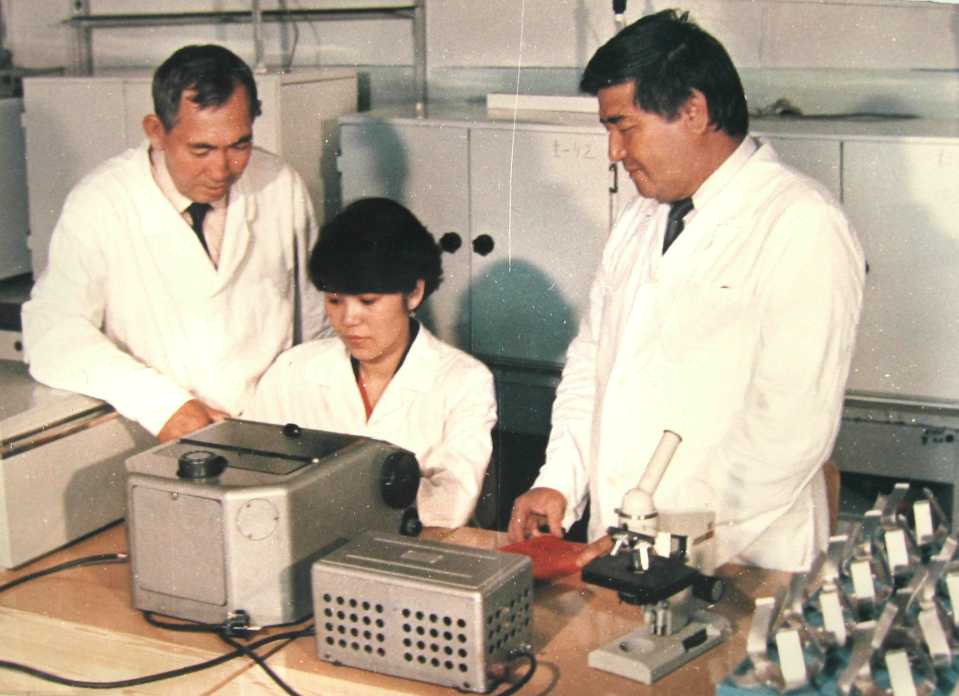
A number of effective developments by B.T. Tolysbaev and his student, senior teacher O.B. Bisenbaev include work on the production of feed preparations of urobacteria as biostimulants for birds. The drug is recommended for industrial production and supply to State Agricultural Industry enterprises.
Professor G.M. made a great contribution to the development of the department. Ivanova and associate professor O.Sh. Bayturina .
Professor G.M. Ivanova received a drug to prevent aeromonosis of grass carp and silver carp. It produced strains of acidophilic bacteria resistant to streptomycin and tetracycline, and also obtained various strains of bacteria used to increase the productivity of fish and animals, and to preserve feed and meat. All strains received copyright certificates from the USSR Invention Committee. Under her leadership, Shafika , Mohammed (Egypt), and O. Gordienko defended their candidate dissertations.
|
|
|
Associate Professor O.Sh. Bayturina and her students (Sh.B. Myrzabekova , D.E. Arzymbetov ) For the first time in Kazakhstan, chlamydia abortion of sheep was diagnosed. The epizootology of the disease in the republic has been studied, the main sources of infection have been clarified, the issues of chlamydia carriage have been studied , and the timing of diagnostic serological studies has been established.
In 1972, for scientific achievements, associate professor O.Sh. Baiturina was awarded the State Prize of the Kazakh SSR.
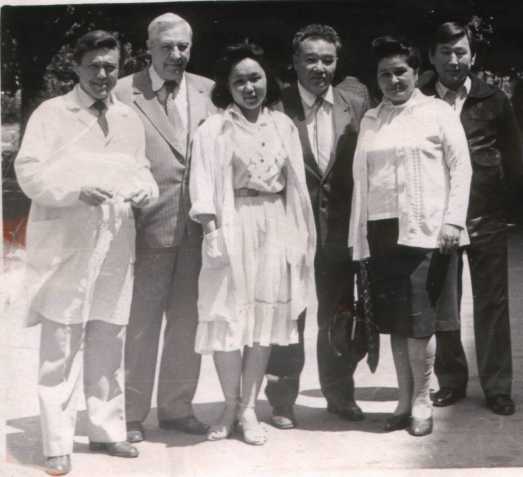
In connection with the creation of the Kazakh State Agrarian University and the reorganization of university structures on the basis of the country's well-known Kazakh Agricultural and Almaty Zooveterinary Institutes, in 1996 the department was renamed the Department of Microbiology and Infectious Diseases.
The newly created Department of Microbiology and Infectious Diseases (1997) included the Department of Epizootology with a veterinary sanitation clinic and the Department of Parasitology with a clinic of invasive diseases .
From 1997 to 2001, the department was headed by Professor M.S. Sabanshiev is a prominent scientist in the field of parasitology. He made a great contribution to the diagnosis of trypanosomiasis and the study of the causative agents of this disease.
From 2001 to 2002, the department was headed by corresponding member of the National Academy of Sciences of the Republic of Kazakhstan, Doctor of Historical Sciences , Professor T.S. Saiduldin . A prominent scientist, academician T.S. Saiduldin made a great contribution to the diagnosis and prevention of brucellosis in farm animals.
Since 2002, the Department of Microbiology and Infectious Diseases has been renamed to the Department of Microbiology, Virology and Immunology.
С 2002 г. By 2009 г. The department was headed by Doctor of Historical Sciences , Professor K.B. Biyashev , holder of the Order of Parasat .
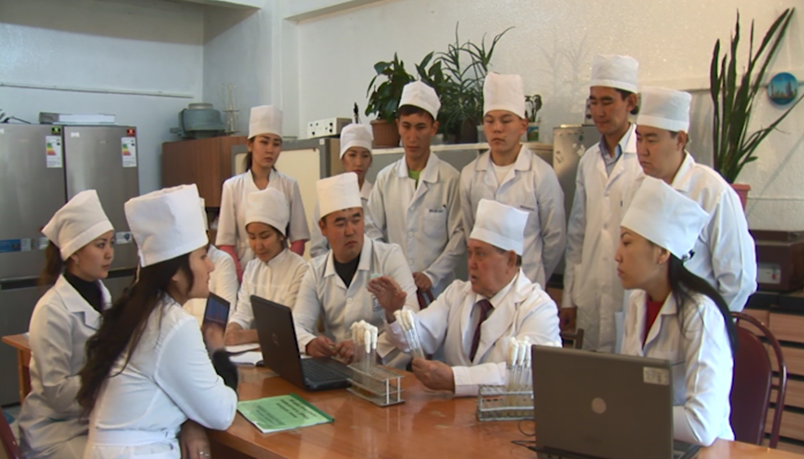
Professor Biyashev K.B. — is engaged in research in the field of veterinary medicine, in particular biotechnology and genetic engineering, aimed at creating environmentally friendly, highly effective vaccines and serums. He has developed and implemented manufacturing technologies, control methods and regulatory and technical documentation for more than 40 biological products that are extremely necessary to protect animal health from particularly dangerous infectious diseases that cause great damage not only to livestock production, but also have social significance due to human susceptibility to them. , which are widely used in Kazakhstan and a number of CIS countries.
He is the owner of the State Grant “Best University Teacher of the Year 2008 ” , for many years he was the chairman Dissertation Council for the specialty "Veterinary Medicine".
In 2009, on the basis of three departments: “Microbiology, virology and immunology”, “Parasitology, pathological anatomy ” and “Epizootology and organization of veterinary affairs”, a pilot department “Biological safety” was created. The department was headed by Doctor of Biological Sciences, Professor Tulemisova Zh.K. Her name is included in the catalog “100 most successful women of Almaty”, she is the owner of the State grant “Best University Teacher” “2006 and 2015.” ), Member of the dissertation council of NIVI JSC " Agroinnovation ". It developed and approved 4 NTD per preparations “Acidophilin B-143”, “ Torulakt ” for the prevention and treatment of gastrointestinal diseases of young animals, birds and aeromonosis of fish.).
Since September 2017, the Department of Biological Safety has been divided into the Department of Biological Safety and the Department of Microbiology, Virology and Immunology. The department was headed by Doctor of Biological Sciences, Professor Dzhanabekova G.K.
Dzhanabekova G.K. deals with issues of nonspecific resistance of the animal body and the development of diagnostic tools, treatment and prevention of animal diseases.
Dzhanabekova G.K. was the dean of the veterinary faculty of KazNAU from 2013-2017. Over the entire history of the existence of AZVI, then KazNAU , Dzhanabekova G.K. – the first woman dean of the veterinary faculty. In 2014, two specialties of the faculty: “Veterinary Medicine” and “Veterinary Sanitation” at two levels of education: bachelor’s and master’s degrees, successfully passed international accreditation for five years (2015-2020). Many significant events were also held at the international level.
From 2018, the department was headed by Doctor of Veterinary Sciences, Professor Kirkimbaeva Zh.S.
Professor Kirkimbaeva Zh.S. manufacturing technologies, control methods and regulatory and technical documentation have been developed and implemented for more than 10 biological products that are extremely necessary to protect animal health from particularly dangerous infectious diseases (leptospirosis, pasteurellosis, etc.), causing not only great damage to livestock production, but also having social significance, due to human sensitivity to them.
She is the owner of the State Grant «Best University Teacher of the Year 2009» , for many years she was an academic secretary and deputy chairman Dissertation Council "Veterinary Medicine".
Kirkimbaeva Zh.S. was the dean of the veterinary faculty of KazNARU from 2019 to 2021.
From 2021 to 2025, the department was headed by Dr. Zh. Kirkimbayeva, Doctor of Veterinary Sciences and Professor.
Since the autumn of 2025, the department has been headed by Dr. Arman Zhilqaidar (PhD).

Zhylkaidar Arman, PhD
Head of the DepartmentEducational program
Educational program 6В09104-Veterinary
Catalog of elective disciplines
Catalog of elective disciplines 6В09104-Veterinary 2024-2029
Educational program development plan
EP 6B09101- Veterinary medicine
ED 7М09101Veterinary Medicine 2024-2026
Practice bases and dual training
Practice (practice bases, main partners and dual training)
Graduate model
Model of a graduate
Alumni Association
Work plan of the alumni association
List of graduates
Scientific projects
Scientific developments
Information about publications by department staff
List of publications in international peer-reviewed journals
Research work of students
Regulation on the organization of scientific research work of KazNARU
Plan of research work of students
List of winners of the Republican competition for research work
виртуальный помощник

